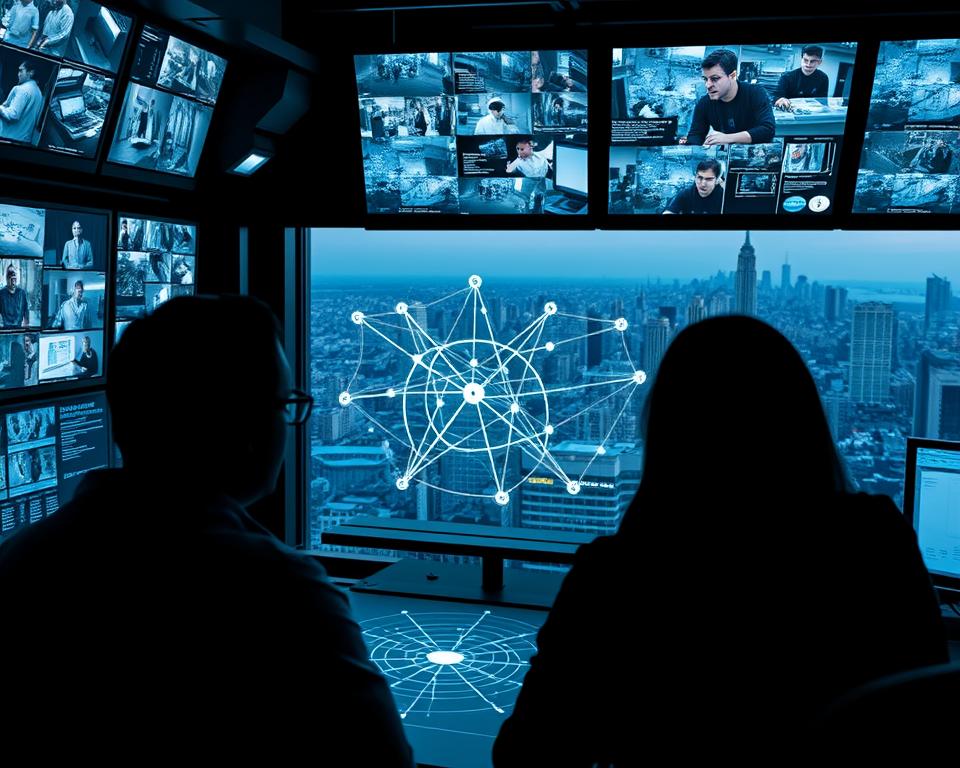Optimizing Protection with Hospital Security Guards
Did you realize that medical centers experience roughly 30 violent episodes each day? This alarming figure highlights the essential role of Hospital Security Guards. They protect not just patients but also staff and confidential information. Within the ever-changing healthcare environment, effective Healthcare Facility Security is critical. It means building protected areas where patients are treated without concerns about violence or data leaks.
Collaborating with established experts such as Divine Protection Services strengthens Medical Center Security Services. This guarantees that security remains foremost while maintaining accessibility. This write-up delves into how commercial property security strategies and monitoring setups can substantially bolster security efforts. It tackles both internal and external threats effectively.

Important Discoveries
- Hospital Security Guards serve a critical function in shielding patients, employees, and private data.
- Healthcare Facility Security is key to preventing violence and securing privacy.
- Combined security systems boost the complete efficiency of hospital safety operations.
- Partnering with companies such as Divine Protection Services delivers personalized security strategies.
- Innovative technologies support modern medical facility security approaches.
- Balancing accessibility and privacy is critical for effective hospital security measures.
Understanding the Need for Hospital Security
Hospital security is paramount for the well-being of patients and staff and the defense of sensitive data. The escalation of violence in medical environments points to the importance of vigilant Hospital Security Guards. Such officers play a key role in ensuring a safe environment and maintaining the rights and dignity of each individual.
Applying solid Healthcare Facility Security tactics is critical to deter hostile actions. This aids in building a supportive environment, bettering the patient and family experience. It further guarantees adherence to regulations such as HIPAA, requiring secure access controls to shield Protected Health Information (PHI). These practices not only shield patients but also cultivate trust between medical providers and their local communities.
| Type of Security Measure | Importance | Compliance with Regulations |
|---|---|---|
| Access Control Systems | Limit unapproved entry and permissions | Vital for meeting HIPAA requirements |
| Surveillance Cameras | Monitor activities and deter criminal behavior | Aligns with rules for secure environments |
| Emergency Response Plans | Offer immediate action during crises | In line with emergency management and safety requirements |
| Training for Security Personnel | Prepare personnel with crisis management abilities | Ensures compliance with safety standards |
Investing in robust security measures and training for personnel is essential for protecting hospitals and healthcare settings. These frameworks establish a secure, compliant environment, fundamental for delivering quality care to patients.
Importance of Hospital Security Guards
Hospital security personnel perform a critical role in safeguarding hospitals. They oversee entry points to deter unauthorized access, manage emergencies, and employ conflict resolution to avert dangers. After receiving instruction from Divine Protection Services, they detect and handle signs of aggression or unrest.
Their visibility is crucial for ensuring the welfare of patients and employees. They safeguard the hospital’s functions, vital for a therapeutic atmosphere. By delivering security, they enrich patient care and lower risks.
High-Tech Tools for Hospital Security
Modern healthcare environments increasingly rely on Advanced Technologies to bolster security measures. Medical Center Security Services skillfully combine technologies such as AI-enabled cameras to boost monitoring functions. These systems deliver instant monitoring and insights, empowering personnel to react to incidents quickly.
A major element in Healthcare Security Solutions involves deploying access control systems. These solutions confine entry to restricted areas, ensuring that only sanctioned personnel can access crucial sections. Using biometric authentication, hospitals can incorporate another layer of protection for sensitive patient data and essential medical gear.
AI-based security tools serve a critical function in physical protection. Face recognition and behavior analysis allow security teams to react quickly to security incidents. Advanced video analytics facilitate operational decision-making, maintaining continuous oversight of hospital environments. This contributes to a protected setting for staff and patients alike.
| Innovation | Deployment | Gains |
|---|---|---|
| AI-driven Surveillance | Live tracking | Immediate threat identification |
| Access Control Systems | Regulated entry | Guarding important sections |
| Facial Recognition | Personal identification | Blocking illicit entry |
| Video Analytics | Operational oversight | Data-driven decision-making |
Leading Technologies do more than guard hospital resources—they also build a protected atmosphere for all. By investing in these cutting-edge tools, healthcare facilities can remain vigilant against security threats. This guarantees top-tier patient care.
Healthcare Security Methods
Solid Healthcare Facility Security frameworks are crucial for defending patients, staff, and visitors in healthcare centers. Executing detailed risk analyses is the basis of these approaches. By detecting flaws, healthcare institutions can formulate specialized plans for various cases. This boosts their readiness for any incidents that may occur.
It’s vital to encourage reporting of unusual behaviors and threats. Healthcare facilities must have systems ready to respond quickly to such reports. This proactive view in Healthcare Facility Security cultivates a culture of shared safety.
Managing visitors is a key component of Medical Center Security Services. Making sure that only permitted persons gain entry preserves a safe setting. Overseeing exchanges between patients and medical staff further reduces threats. This secures the area for all. Presented below is a table detailing the main elements of successful security strategies.
| Security Module | Explanation | Benefits |
|---|---|---|
| Risk Assessments | Identifying vulnerabilities and assessing possible threats. | Improves preparedness and response times. |
| Incident Reporting | Prompting stakeholders to report odd conduct. | Enables swift threat responses and heightens vigilance. |
| Visitor Management | Guidelines for supervising and restricting access to sites. | Improves protection and lowers unauthorized entry. |
| Staff Training | Offering safety training to staff members. | Arms employees with skills for responding to security situations. |
Preparing Security Personnel Competently
Proper training of hospital security staff is critical for upholding safety in medical centers. Persistent schooling supports staff in meeting new security challenges. It additionally improves their skill in handling diverse incidents.
‘Divine Protection Services’ emphasizes developing strong situational awareness in security personnel. This encompasses mastering conflict resolution techniques for tense interactions. Regular drills and simulation exercises reinforce protocols. Employees develop skills to tackle threats promptly while safeguarding dignity and respect.
This approach to training security personnel goes beyond defensive practices. It nurtures a culture of protection and expertise in hospital settings. By zeroing in on core skills, healthcare facilities ensure their security teams confront issues effectively.
Meeting Compliance Requirements
Adhering to Regulatory Standards is critical for medical centers striving for safety and credibility. HIPAA, for instance, requires secure access controls to protect Patient Health Information (PHI). These policies thwart unauthorized entry and avert sensitive data compromises.
Healthcare providers can boost their compliance by adopting detailed policies. They encompass routine inspections, employee education, and explicit incident reporting methods. Such measures not only protect patient safety but also build community trust.
Organizations like Divine Protection Services provide tailored compliance solutions for medical centers. Their proficiency in Hospital Security Services assures that security personnel are able to satisfy regulatory demands.
Dedication to compliance lowers risks and forges reliable patient-provider connections. An anticipatory approach to regulations advantages the whole healthcare framework.
Hospital Security Officers in Practice
Hospital Security Staff serve a key function in keeping healthcare settings secure. Their efforts appear in numerous practical scenarios, showcasing their anticipatory methods. For instance, they oversee disputes in waiting rooms, swiftly settling them to avert escalation.
In high-pressure instances, these officers guide individuals to protective zones, assisting them as required. This practice secures those who are vulnerable and upholds a serene atmosphere. Their teamwork with law enforcement in emergencies emphasizes the value of Professional Healthcare Security. They often serve as the first line of response.
The training from Divine Protection Services prepares these guards to handle emergencies well. They acquire skills to uphold policies while maintaining respect for all. This fusion of authority with compassion establishes them as indispensable to the healthcare team. They commit to ensuring security and protection for everyone on site.
Customizing Security Solutions for Healthcare Facilities
Medical centers encounter specific security issues that require a customized approach. Adapting Security Solutions is vital for addressing these concerns, providing a secure environment for patients and personnel. Partnering with professionals like Divine Protection Services lets hospitals design security programs suited to their unique demands.
An all-encompassing security framework includes key topics like violence control and pharmaceutical security. Through advanced tech, facilities can enhance their security practices while following HIPAA guidelines. This usually entails visitor management platforms and dynamic access control solutions that adjust to evolving demands.
The function of Medical Facility Guards is equally important. They benefit from targeted training to deal with security episodes and ensure sustained vigilance. Their presence not only discourages threats but also reassures staff and patients.
The following table demonstrates how Personalizing Security Solutions tackles diverse healthcare issues:
| Security Concern | Custom Solution |
|---|---|
| Violence Prevention | Training for Medical Facility Guards in de-escalation techniques |
| Medication Security | Setting up protected drug cabinets and surveillance solutions |
| Visitor Management | High-level visitor vetting and credential issuance procedures |
| Access Control | Flexible access control platforms that adapt to operational demands |
By carefully planning and partnering with the right organizations, healthcare facilities can establish a strong security posture. This comes from Personalizing Security Solutions to fit their individual needs. Combining human oversight with technology significantly improves safety, leading to a more secure and efficient healthcare setting.
The Bottom Line
Securing the safety and health of patients, personnel, and confidential data is critical in hospitals. Hospital Security Guards today employ cutting-edge technologies and instruction to fight contemporary risks. This evolution not only secures physical spaces but also fosters trust among patients and healthcare providers.
Adapted Healthcare Security Solutions assist hospitals in remaining at the forefront of the changing security scene. Joining forces with established entities such as Divine Protection Services enables healthcare institutions to tackle safety worries adeptly. By blending personnel training with cutting-edge technology, hospitals can foster a secure environment for healing and care.
The healthcare sector faces growing risks, making professional security measures indispensable. Hospitals have to integrate these progressing strategies to fortify their environments and uphold operational honor.


